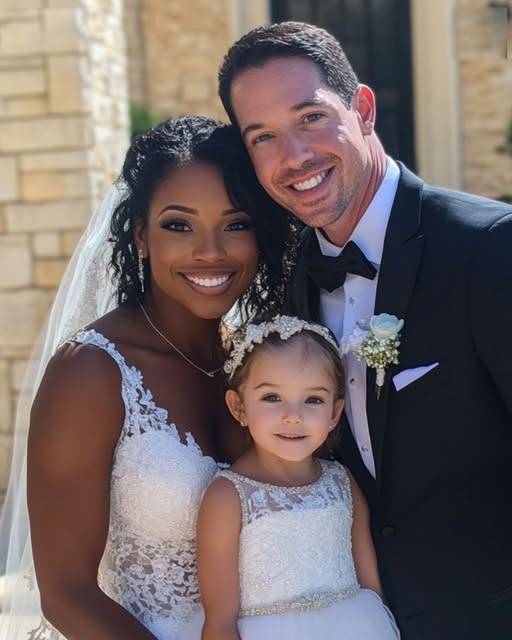Two years after my wife passed away, I finally started to breathe again. The house had been too quiet for too long — the kind of silence that seeps into your bones. My daughter, Sophie, was five then, all curls and big eyes, far too young to carry the kind of sadness that lived in her face. When I met Amelia, it felt like sunlight breaking through the fog. She was gentle, patient, warm — everything I thought our little family needed to feel whole again.
For a while, things were good. The laughter came back. Sophie giggled again at bedtime stories. Amelia filled the house with fresh flowers and soft music. She made pancakes on Sundays and always tucked Sophie in with a kiss. I thought we were healing — all three of us.
Then, one evening, Sophie tugged on my sleeve while I was cleaning up after dinner. Her voice was small, uncertain.
“Daddy,” she whispered, “new Mom is different when you’re gone.”
I froze. “Different how, sweetheart?”
She fidgeted with the edge of her dress. “She makes weird rules. And sometimes I hear noises from the attic. She says I’m not allowed to go up there.” Her little brow furrowed. “I don’t like it.”
My heart sank. Amelia had always been kind to her — firm but fair. I tried to reason with myself. Maybe Sophie misunderstood. Kids see things differently. Still, the unease stuck with me long after she’d gone to bed.
The attic.
Amelia spent a lot of time up there, especially when she said she was “organizing old things.” I’d never questioned it. But after Sophie’s words, I noticed small things I hadn’t before: the faint smell of paint, the quiet footsteps overhead late at night, the way Amelia avoided talking about it.
A week later, I had to leave for a work trip — seven days away. Before I left, Amelia smiled, assuring me everything would be fine. “We’ll have girls’ time,” she said, brushing Sophie’s hair. “We’ll bake cookies, maybe paint.” Sophie smiled faintly, though her eyes stayed wary. I kissed them both goodbye and tried to push the doubt aside.
When I came home, everything looked the same. The house was spotless, the kitchen smelled faintly of vanilla, and Amelia greeted me with her usual warmth. But Sophie ran to me and buried her face in my shirt, trembling.
“What’s wrong, honey?” I asked.
Her voice came out in a whisper. “She locks herself in the attic. Every night.”
I looked at Amelia, who was setting down a tray of tea, smiling like nothing was wrong. I told myself it was my imagination, that maybe the trip had made Sophie clingy. But when night fell and the house grew quiet, I heard it — faint footsteps above, the creak of floorboards, the soft sound of something moving. Then, the click of a door.
Amelia wasn’t in bed.
I slipped out quietly and followed the sound up the stairs. The attic door was shut. Light glowed from beneath it. My pulse quickened as I turned the knob and pushed it open.
What I saw stopped me cold.
The attic had been transformed — pastel-painted walls, strings of fairy lights, soft rugs, and a tiny wooden table set for tea. There was an easel with drawings pinned around it — all of Sophie. Crayon portraits of her smiling, dancing, hugging her mother. Some were scrawled by a child’s hand; others were carefully outlined by an adult.
Amelia turned around, startled, her face pale in the warm light. “I wanted it to be a surprise,” she said softly, clutching a paintbrush. “For Sophie.”
I blinked, trying to process it. “A surprise?”
Her eyes filled with tears. “I know she doesn’t like me,” she whispered. “I thought maybe if I made something special for her, it would help.”
The anger I’d felt moments earlier dissolved into confusion. “Sophie said you were mean to her,” I said quietly. “That she was scared.”
Amelia sank onto a small stool, her voice trembling. “I didn’t mean to be. I just—” She stopped, wiping her face. “I was trying to be a good mother. I thought being strict made me responsible. But every time she looked at me, I saw the way she missed her mom. And I panicked. I thought if I controlled everything — the house, her bedtime, her clothes — maybe she’d accept me. But I was wrong.”
She took a deep breath. “When you were gone, I realized I’d been trying to be perfect, just like my own mother tried to be. She was strict. Distant. I told myself I’d never be like her, but I became her anyway.”
Her words hung heavy in the air. I looked around the attic again — the drawings, the toys, the effort. It wasn’t madness. It was guilt.
The next evening, I asked Sophie to come upstairs with me. She hesitated, clutching her stuffed bear, her little shoulders tense. “It’s okay,” I said softly. “I want to show you something.”
When we reached the attic, Amelia was standing beside the tea table, her hands clasped nervously. Sophie peeked inside, her eyes widening.
“Is this for me?” she whispered.
Amelia nodded. “I made it while your dad was away. I wanted to surprise you.”
Sophie looked at me, uncertain, then back at Amelia. “You’re not mad anymore?”
Amelia knelt down. “I was never mad at you, sweetheart. I just didn’t know how to be your mom. But I’m learning.” Her voice cracked. “And from now on, no more scary rules. We’ll clean together, and afterward… ice cream.”
Sophie hesitated for a heartbeat — then ran forward and threw her arms around her. “You’re not scary anymore,” she said, her voice muffled against Amelia’s shoulder.
Amelia let out a shaky laugh, holding her close. “Good,” she whispered. “Because I love you very much.”
That night, the three of us sat in the attic under fairy lights, eating melted ice cream and telling stories. Sophie giggled as Amelia painted tiny stars on her cheeks with leftover glitter, her earlier fear forgotten.
Watching them, I realized something I hadn’t understood in years of grief: love doesn’t come neatly packaged. It’s clumsy, flawed, and full of trial and error. It doesn’t always look gentle — sometimes it stumbles, sometimes it hides — but when it’s real, it finds its way back to warmth.
The attic, once a mystery that filled me with suspicion, had become something else entirely: a symbol of our second chance.
When Sophie finally drifted to sleep that night, her head resting against Amelia’s arm, I caught her whisper one last thing before her eyes closed.
“I like our new mom better when she smiles,” she murmured.
I smiled, too. For the first time in a long while, our house felt alive again — filled not with ghosts of the past, but with the sound of laughter and the quiet, imperfect rhythm of a family learning to love again.


